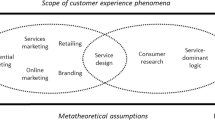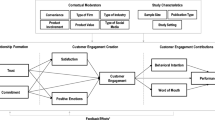Abstract
This research study sought to identify whether there is a relationship between ethical perceptions and culture. An examination of the cultural variables suggests that there is a relationship between two of Hofstede's cultural dimensions (i.e., Uncertainty Avoidance and Individualism) and ethical perceptions. This finding supports the hypothetical linkage between the cultural environment and the perceived ethical problem variables posited in Hunt and Vitell's General Theory of Marketing Ethics (1986).
Similar content being viewed by others
References
Armstrong, R. W. and Everett J. E.: 1993, ‘The Dimensions of Ethical Perceptions in International Marketing’, Asia Journal of Marketing 1, 61–71.
Armstrong, R. W., B. W. Stening, J. K. Ryans, L. Marks and M. Mayo: 1990, ‘International Marketing Ethics: Problems Encountered by Australian Firms’, Asia Pacific Journal of International Marketing, 2(2), 6–15.
Bartels, R.: 1967. ‘A Model for Ethics in Marketing’, Journal of Marketing (Jan.), 20–26.
Carmines, E. G. and R. A. Zeller: 1979. ‘Reliability and Validity Assessment’, in John L. Sullivan (ed.), Sage University Paper series on Quantitative Applications in the Social Sciences 07-017 (Sage Pub, Beverly Hills and London).
Chan, C. F. and K. H. Lee: 1986. ‘Organizational Culture and Salesperson's Ethical Position’, in R. T. Hsieh and S. A. Scherling (eds.), Proceedings of the Academ of International Asia Regional Conference, Taipei, Vol. 1, 636–644.
England, G. W.: 1967. ‘Cultural and Individual Differences in Managerial Values’, in S. P. Sethi and J. N. Sheth (eds.), Multinational Business Operations: Long-Range Planning, Organisation and Management (Goodyear Publishing Company, CA), pp. 156–170.
England, G. W.: 1978, ‘Managers and Their Value Systems: A Five-Country Comparative Study’, Columbia Journal of World Business (Summer), 35–44.
England, G. W., O. P. Dhingra and N. C. Agarwal: 1974, The Manager and the Man: A Cross-Cultural Study of Personal Values (Kent State University Press, Kent), pp. 1–15, 19–47, 103–125.
Erickson, G. M., J. K. Johansson and P. Chao: 1984, ‘Image Variables in Multi-Atribute Product Evaluations: Country of Origin Effects’, Journal of Consumer Research, 11 (Sept.), 697–700.
Ferrell, O. C. and L. G. Gresham: 1985, ‘A Contingency Framework for Understanding Ethical Decision Making in Marketing’, Journal of Marketing 49 (Summer), 87–96.
Ferrell, O.C., L. G. Gresham and J. Fraedrich: 1989, ‘A Synthesis of Ethical Decision Models for Marketing’, Journal of Marcromarketing 9 (Fall), 55–64.
Fishbein, M. and I. Ajzen: 1975, Attitude, Intention and Behavior (Addison-Wesley, Reading, MA).
Harris, P. R. and R. T. Moran: 1981, Managing Cultural Differences (Gulf Publishing Company, Houston, TX), pp. 103–112.
Ho, D. Y. F.: 1976, ‘On the Concept of Face’, American Journal of Sciology 81, 867–884.
Hofstede, G.: 1980, Culture's Consequences (Sage Publications, Inc., Beverly Hills, CA).
Hofstede, G.: 1983, ‘The Cultural Relativity of Organizational Practices and Theories’, Journal of International Business Studies (Fall), 75–89.
Hunt, S. D. and S. Vitell: 1986, ‘A General Theory of Marketing Ethics’, Journal of Macromarketing 8 (Spring), 5–16.
Inkeles, A. and D. J. Levinson: 1969, ‘National Character: The Study of Modal Personality and Sociocultural Systems’, in G. Lindzey and J. E. Arsonson (eds.), The Handbook of Social Psychology, Vol. 4 (Addison-Wesley, Reading, MA).
Kohlberg, L.: 1969, ‘Stage and Sequence: The Cognitive Development Approach to Socialization’, in D. A. Goslin (ed.), Handbook of Socialization Theory and Research (Rand McNally, Chicago), pp. 347–480.
Robinso, W. S.: 1950, ‘Ecological Correlations and the Behavior of Individuals’, American Sociological Review 15, 351–357.
Rowen, S.: 1986, Comparative and Multinational Management (John Wiley & Sons, Brisbane).
Singhapakdi, A. and S. J. Vitell: 1990, ‘Marketing Ethics: Factors Influencing Perceptions of Ethical Problems and Alternatives’, Journal of Macromarketing (Spring), 4–18.
Tse, D. K., R. W. Belk and N. Zhan: 1988, ‘Learning to Consume: A Longitudinal and Cross-Cultural Content Analysis of Print Advertisements from Hong Kong, People's Republic of China and Taiwan’, Journal of Consumer Research.
Tse, D. K., K. H. Lee, I. Vertinsky and D. A. Wehrung: 1988, ‘Does Culture Matter? A Cross-Cultural Study of Executives' Choice, Decisiveness, and Risk Adjustment in International Marketing,’ 52 (October), 81–95.
Vitell, S. J., S. L. Nwachukwu and J. H. Barnes: 1993, ‘The Effects of Culture on Ethical Decision-Marking: An Application of Hofstede's Typology’, Journal of Business Ethics 12, 753–760.
Wallenford, M. and M. D. Reilly: 1983, ‘Ethic Migration, Assimilation and Consumption’, Journal of Consumer Research 10 (Dec.), 292–302.
Whitely, W. and G. W. England: 1980, ‘Variability in Common Dimensions of Managerial Values due to Value Orientation and Country Differences’, Personal Psychology 33, 77–89.
Author information
Authors and Affiliations
Additional information
Robert Armstrong is Professor of Marketing and Research Associate of the Asia Research Centre at Murdoch University, Programme Chair for the MBA and Marketing and Media degree programmes. Professor Armstrong has been in Australia for six years, he spent two years at the University of Western Australia and the last four years at Murdoch University. To date, he has published over 20 journal articles and an Australian Marketing Research textbook.
Rights and permissions
About this article
Cite this article
Armstrong, R.W. The relationship between culture and perception of ethical problems in international Marketing. J Bus Ethics 15, 1199–1208 (1996). https://doi.org/10.1007/BF00412818
Issue Date:
DOI: https://doi.org/10.1007/BF00412818




